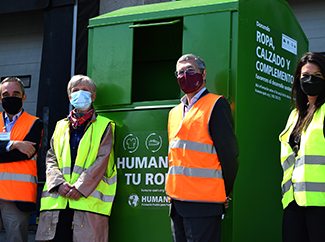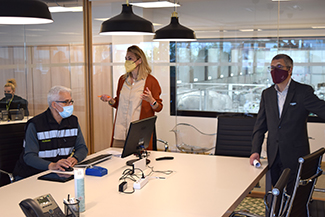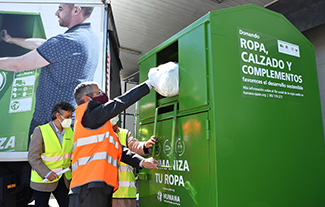consent_cookie
Duración: 1 year
Stores the user's cookie consent state
13-05-2021
Humana received today at its facilities in Leganés (Community of Madrid) the visit of Hugo Morán, Secretary of State for the Environment, accompanied by Ismael Aznar, General Director of Environmental Quality and Assessment.
During his visit to the Foundation's Textile Reuse Preparation Plant, Morán was very interested in the management of textile waste and its great potential for recovery and reuse, as well as generating green employment. In 1998, Moran himself, as Mayor of Lena, signed an agreement with Humana for the collection of textiles in the Asturian municipality. 23 years later, the Secretary of State has had the opportunity to visit the Foundation's facilities.
The visit has allowed Morán to see first-hand the work carried out in this plant, which, together with the adjoining facility, make up the largest complex in Spain dedicated to the management of this waste, with 10,000 square meters of surface and a team of 100 people, including specialists in textile processing and personnel from the Central Departments of the organization. The complex has a maximum annual processing capacity of 18,000 tons of textile, through a semi-mechanized system whose objective is to obtain the maximum use of the waste.
The destination of the garments prepared for reuse is:
Obligatory nature of the selective collection of textiles from 2025
On January 1, 2025, the selective collection of used textiles will be mandatory throughout the EU. This fact, together with the future Law on Waste and Contaminated Soils, are an opportunity and a huge challenge to give the definitive impulse to the appropriate management of this resource, faithful to the hierarchy of waste and a circular economic model, in which it prevails the reintroduction of textiles in the production chain, prolonging its life cycle.
The 2025 horizon and the EU objectives are, at the same time, the fundamental stimulus for the formulation of various initiatives that will lead to a Collective System of Expanded Producer Responsibility (SCRAP). Humana remains very attentive to these possible initiatives that should arise from textile producers, so that they take into account and are nurtured by the experience accumulated by authorized managers. The future SCRAP and the producers can and must take advantage of the know-how of the current textile managers to create an integrating system, with competitiveness and professionalism as a flag.
The road ahead is long and the terms are getting shorter and shorter: each Spaniard discards 25 kilos of textiles every year, according to the Ministry of Ecological Transition and Demographic Challenge. This represents more than one million tons per year. Only 15% is recovered by an authorized manager. The rest ends up being disposed of, therefore, improperly. According to the European Commission, for every kilo of clothing recovered and not taken to a waste treatment center, 3,169 kg of CO2 are no longer emitted.
Social benefit of sustainable textile management
Humana's goal is to consolidate the selective collection of used clothing and its preparation for reuse as a fundamental part of waste management. By obtaining the maximum possible use of the textile and giving it a second life, we favor a circular economy model. We convert waste into resources and provide them with a social purpose since the garments that are recovered are an asset that, properly managed, becomes an engine of employment and a generator of funds for development cooperation in the Southern Hemisphere and support local and urban and social agriculture in our country. In this way we contribute to a more economically and socially sustainable society.


